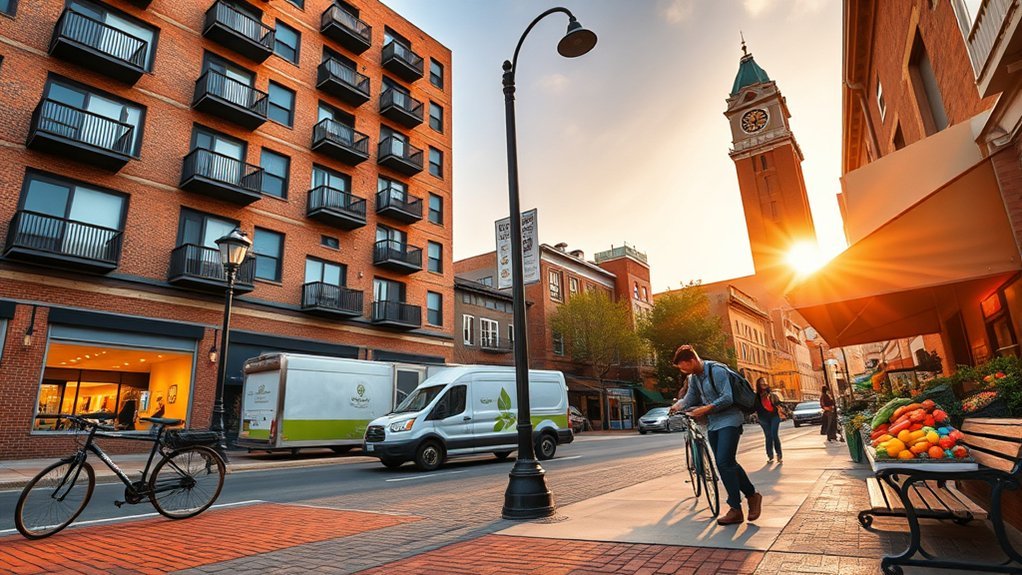Living in Durham won’t exactly be a bargain, but you can make the numbers work if you plan carefully. You’ll find median rents around $1,318 and home prices in the $388K–$525K range, with utilities, internet, groceries, transport, and healthcare adding several hundred dollars more each month. Aim to keep housing under 30% of gross income and you’ll see how your budget can balance—keep going to compare neighborhoods and realistic salary targets.
Cost of Living Overview and Regional Context

Although Durham’s overall cost of living sits about 1–2% below the U.S. average, housing pushes the city above average—its housing index is roughly 106.5 and median home prices range from about $388K to $525K—so your neighborhood and housing choice will largely determine whether you feel inexpensive or costly here.
Durham’s overall cost is just below average, but housing—median homes $388K–$525K—can push costs higher depending on neighborhood.
You’ll find non‑housing components close to national norms: grocery prices (~99.2) and utilities (~100.1) mean everyday spending is predictable.
Median household income sits near $79k, which helps offset housing costs for many residents.
Expect median rent figures around $1,318–$1,571 monthly, with a typical one‑bedroom apartment about $1,158 (but downtown or premium units hit $1,686+).
Utilities and internet commonly add $283–$740 monthly depending on package.
Transportation costs are comparatively low (~84.1), lowering commute expenses in the Research Triangle.
Use these benchmarks to build a realistic monthly budget and weigh tradeoffs between rent, commuting, and discretionary spending. Building a house can often be more expensive than buying an existing home, which might influence your decision on housing.
Housing, Rent, and Homebuying in Durham

If you’re weighing rent versus buying in Durham, expect neighborhood choice and current mortgage rates to be the deciding factors: the city’s housing index sits at about 106.5 and median home prices range roughly $388K–$521K, while median rents run near $1,318/month (one‑bed ≈ $1,158; two‑bed ≈ $1,349) and downtown or premium units can hit $1,686–$3,000.
You should compare the median home price and prevailing mortgage rates (around 6.7% in early 2025) against expected rent growth and your down‑payment capacity.
In many cases renting is more economical short‑term, especially if your monthly budget can’t absorb higher mortgage payments, taxes, and maintenance.
Neighborhoods vary: affordable pockets show rents from about $850–$1,850, while central, trendier areas demand premiums.
Use the 30% rule as a sanity check—affording a typical one‑bed at $1,158 implies roughly $46,320/year gross.
Run scenario models for 3–7 years to decide whether to lock into a mortgage or stay flexible with rent. Additionally, consider the potential long-term savings from avoiding towing and battery replacement costs when evaluating your transportation expenses.
Monthly Bills: Utilities, Internet, and Transportation

Dig into monthly bills with a clear set of numbers: basic utilities for a ~915 sq. ft. apartment run about $163.21/month (other estimates near $187.89), phone plus internet (60+ Mbps, unlimited) averages $120.23/month (some summaries say $189–$190), so using the lower figures you’d pay roughly $283.44/month for utilities and telecom; expect higher summer electricity from hot, humid weather.
You should budget monthly utilities for electricity and air conditioning spikes in July–August. Phone and internet plans vary, but $120.23 is a realistic baseline for unlimited service and reliable speeds. Additionally, if your air conditioning system is not functioning properly, you may need to consider the potential costs of air conditioning hose replacement to maintain efficiency.
For transit, Durham offers GoDurham and regional service via GoTriangle; a 31-day transit pass costs $40, letting you cap recurring transportation costs.
The city’s transportation index (~84.1) implies below-average transportation costs overall, though annual transport estimates for a single adult run near $9,252 if you include vehicle ownership.
Track monthly bills closely so you can adjust usage, especially AC-driven electricity, to control costs.
Essentials: Groceries, Healthcare, and Child Care Costs

You’ll find groceries close to the U.S. average—household grocery spending runs about $705 monthly for renters and $1,402 for homeowners—so factor that when comparing to average monthly rent or a one‑bedroom apartment.
Typical item prices (eggs ~$3.25–$3.56, milk ~$4.61–$4.79, bread ~$4.03–$4.10) help you build realistic grocery line items.
- Groceries and household grocery spending: plan for roughly $700–$1,400/month depending on housing and household size.
- Healthcare cost: annual estimates are about $3,158 for a single and $10,201 for a two‑adult one‑child family; budget for doctor visits ($150–$181) and dentist visits (~$112–$114) as out‑of‑pocket items.
- Child care costs: expect about $13,719/year for one child, $24,511 for two—child care is a major recurring part of your monthly budget and overall cost of living. Additionally, it’s important to consider that operating a group home can also incur significant expenses such as licensing fees and staffing costs.
Budgeting Tips, Salary Needs, and Neighborhood Comparisons

When you map out a Durham budget, focus first on how housing, transportation, and childcare will shape your take‑home needs—keeping rent at or below the common 30% guideline means a one‑bedroom median rent of $1,158 requires about $46,320 pre‑tax annually (≈ $3,860/month), while the city’s median household income of $79,234 gives more leeway for higher rents or extra costs like student loans; also budget roughly $283/month for utilities and phone, $771/month for transportation, and about $263/month for healthcare, and remember childcare can add over $1,100/month per child.
Use these budgeting tips: compare median rent to your salary, factor monthly essentials (utilities and internet, transportation costs, healthcare), and weigh buying versus renting given a housing index ~106.5 and a median home price ≈ $388,000. Additionally, consider long-term savings from investing in fitness and wellness when planning your overall budget.
For neighborhood comparisons, expect downtown/premium units $1,686–$3,000; more affordable areas range $850–$1,850.
Prioritize commute, amenities, and savings when choosing location.
Frequently Asked Questions
What Is the Average Cost of Living in Durham NC?
You’ll find Durham’s overall cost of living about 1–2% below the U.S. average. Expect median rent near $1,318, median home ~$388,000, monthly utilities around $283, and typical income roughly $79,234.
How Much Money Do You Need to Live Comfortably in Durham, NC?
Comfortably, you’ll need roughly $58k–$79k pre-tax yearly. Balancing basics, bills, and buffer, budget for rent, utilities, food, transport, healthcare, and savings—about $3,800–$6,500 monthly depending on housing and lifestyle.
What Is the Cost of Living in North Carolina per Month?
You’ll typically need about $3,500–$5,000 per month in North Carolina, depending on city and lifestyle; that covers rent, utilities, groceries, transportation, and healthcare, with higher costs in urban areas like Raleigh or Charlotte.
How Expensive Is It to Live in Durham?
Durham’s moderately expensive: you’ll pay slightly below U.S. average overall, but housing runs higher—expect median one‑bed rent about $1,158, typical utilities/internet ~$300, groceries near average, and home prices around $388k–$521k.
Conclusion
You now have a clear, practical snapshot of Durham costs: aim to keep housing at or below 30% of gross income, expect median rents around $1,318 and homes roughly $388K–$525K, and budget monthly for utilities ~$163, phone/internet ~$120, groceries ~$705 (renters), transportation ~$771, and healthcare ~$263. Use these numbers to plan salary needs, compare neighborhoods, and tweak spending—so you won’t be blindsided by expenses ever again.


